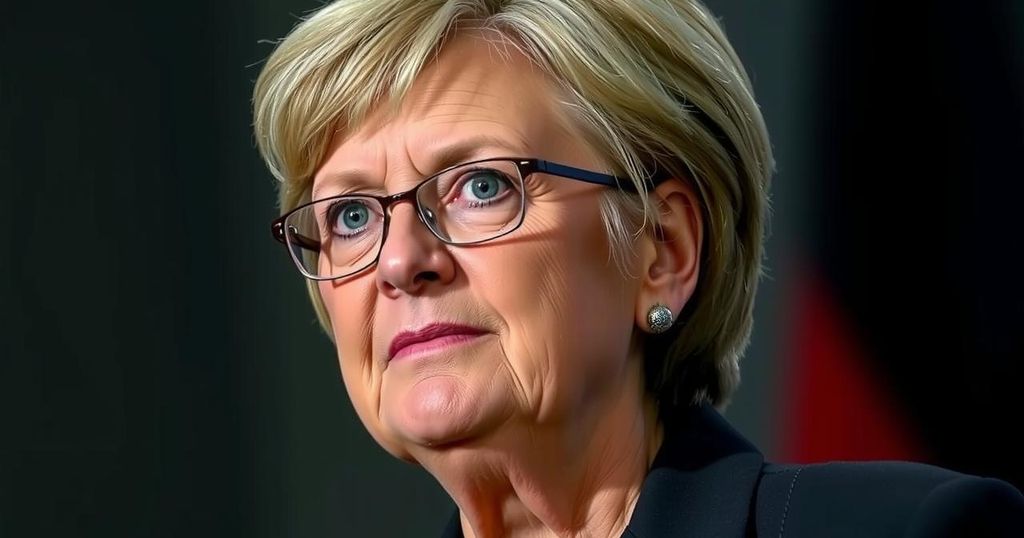World news
AIR FORCE, ALICE WEIDEL, ASIA, BLACKROCK, BUNDESTAG, CDU, CHINA, CHRISTIAN LINDNER, DEFENSE SPENDING, EUROPE, FDP, FRIEDRICH MERZ, GERMANY, GOVERNANCE, GOVERNMENT, HABECK, HAMBURG, IMMIGRATION POLICY, LIN, LINDNER, MER, MERZ, MEXICO, NORTH AMERICA, OLAF SCHOLZ, POLITICS, POPULISM, ROBERT HABECK, SAUERLAND, SCHOLZ, SRI LANKA, SWITZERLAND, WEIDEL
Marisol Gonzalez
0 Comments
Overview of Germany’s Chancellor Candidates for the 2025 Elections
As Germany approaches its 2025 snap elections, key candidates have emerged from various political parties, each presenting unique ideologies and experiences. The candidates include Olaf Scholz (SPD), Friedrich Merz (CDU), Robert Habeck (Greens), Alice Weidel (AfD), Christian Lindner (FDP), Sahra Wagenknecht (Left), and Jan van Aken (Left Party). Their diverse backgrounds and political stances are set to shape the country’s leadership and policy direction in the coming years.
As Germany braces for the snap elections on February 23, 2025, the political landscape has taken shape with a diverse lineup of candidates vying for the chancellorship. Each candidate represents distinct political ideologies and backgrounds, bringing their unique perspectives to the forefront of German politics.
Olaf Scholz, representing the Social Democrats (SPD), has a long-standing career in politics, having served in several capacities including finance minister and currently as chancellor. Despite his experience, he faces challenges in gaining public support, often criticized for his perceived aloofness.
Friedrich Merz, the Christian Democratic Union (CDU) candidate, is notable for being the oldest candidate in decades. His background in law and business, particularly with firms like BlackRock, positions him as a traditional conservative figure. Merz’s candidacy reflects a desire to return to more established conservative values.
The Green Party’s candidate, Robert Habeck, is distinguished by his relatable demeanor and openness about his shortcomings. His prior experience as a writer and philosopher lends him a communicative edge, allowing him to effectively engage with the electorate on pressing issues.
Alice Weidel from the Alternative for Germany (AfD) is recognized for her provocative stances and credentials in economics. Her anti-immigrant rhetoric and far-right positioning highlight the growing trend of nationalism in Europe. Weidel’s connection to international issues, including her residence in Switzerland, underscores her global perspective.
Christian Lindner of the Free Democrats (FDP) is celebrated for his youthful leadership style and expertise in finance. As finance minister, he has been influential in shaping economic policies and is known for his modern, media-savvy image that appeals to younger voters.
Sahra Wagenknecht, representing the Left, combines populist rhetoric with a unique political approach, being critical of both NATO and mainstream climate policies. Her controversial views and strong public presence make her a standout candidate, particularly among those disillusioned with traditional politics.
Lastly, Jan van Aken of the Left Party offers a scientific background, having previously worked with the United Nations. His role as co-chair of the Left serves to revitalize the party’s image amid electoral challenges.
The upcoming elections will not only determine Germany’s leadership but also reflect the evolving political sentiments within the country as candidates offer varying visions for Germany’s future.
The German federal elections of 2025 are pivotal in shaping the future of the nation, particularly as they follow a period of significant political shifts and challenges. Various political parties have nominated their candidates who represent a spectrum of ideologies, from leftist to far-right perspectives. The candidates are tasked with addressing pressing national concerns including economic stability, social issues, immigration policy, and environmental sustainability amidst a changing global landscape. With a history of coalition governments, the outcome of this election will impact Germany’s role in the European Union and its international relationships. As voters prepare to cast their ballots, the candidates’ backgrounds and political positions will play a crucial role in guiding public opinion and electoral success, reflecting broader societal values and priorities.
In conclusion, the candidates for Germany’s chancellorship in the forthcoming 2025 elections each bring distinct experiences and viewpoints that reflect the diverse political climate of the country. From Olaf Scholz’s pragmatism to Friedrich Merz’s conservative values, and from Robert Habeck’s relatable approach to Alice Weidel’s nationalistic rhetoric, the electorate faces a critical choice. As political ideologies continue to evolve, these elections will significantly influence Germany’s future direction both domestically and internationally.
Original Source: www.dw.com




Post Comment